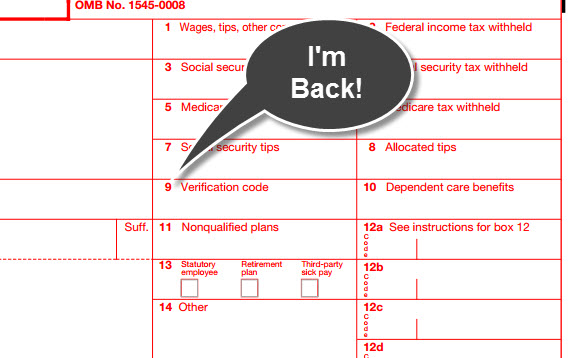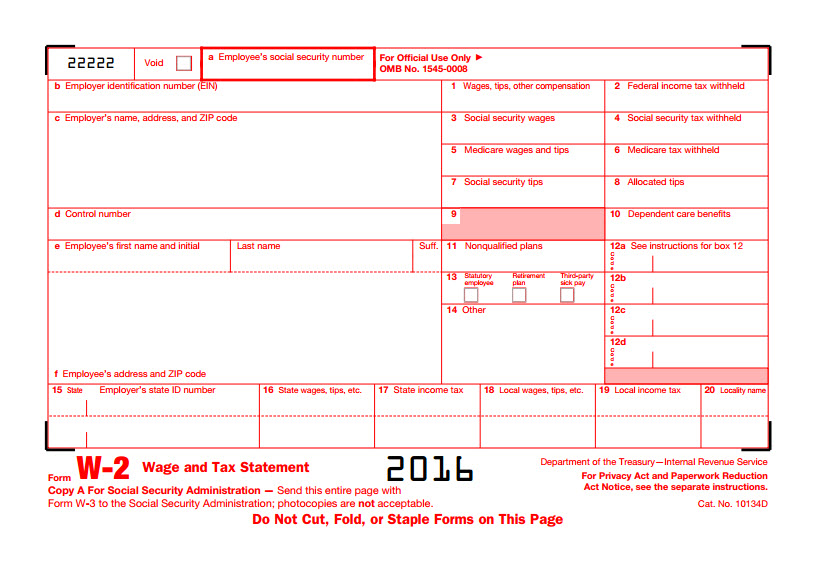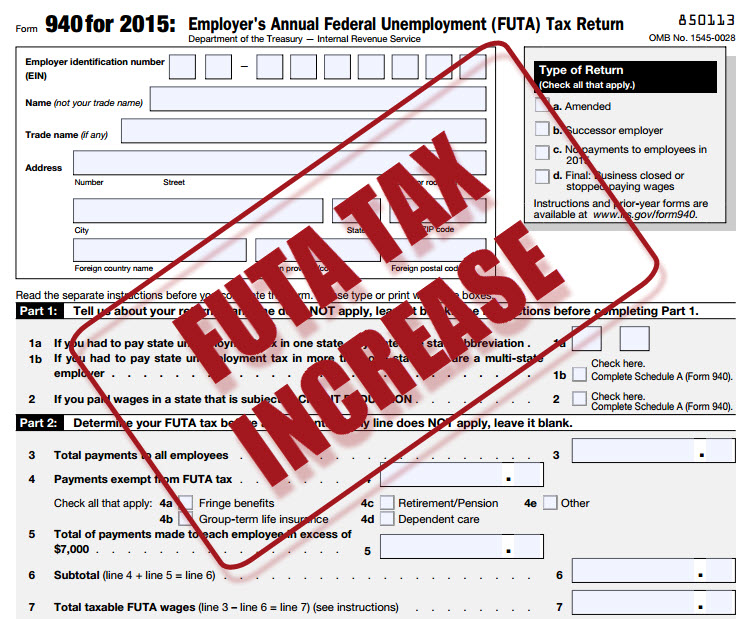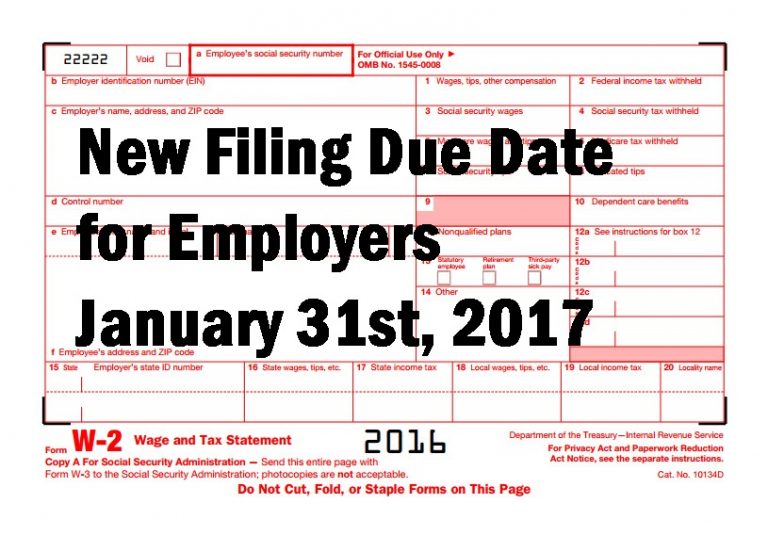While one should always be vigilant about suspicious emails, this time of the year I recommend an even heightened scrutiny. It is not uncommon to receive requests this time of the year from employees who have not received or lost their W-2 form, and in the old days, this request came in person. Nowadays, it is not uncommon to receive a request via email that you may fulfill via replying. It certainly cuts down on the time that it used to take to find the employer’s hard copy, photo copy the copy, and mail the copy to the employee. …
Posts published in “Tax”
Ever since the IRS did away with the Advanced Earned Income Credit (EIC) in 2010, Box 9 on the W-2 form has sat there unused and neglected as a greyed out box. The instructions simply read “Do not enter an amount in box 9.” Now, six years later, the IRS has an idea to help combat tax-related identity theft and refund fraud. Their objective is to utilize this box to verify that the W-2 data submitted by taxpayers on e-filed returns is legitimate. This year, the IRS will run a pilot program where a limited number of W-2s…
Over the next few weeks as employees start to receive their 2016 W-2 form, they may likely have questions as to what all those numbers mean. For example, it is not uncommon for a salaried employee who earns $50,000 per year question why their Box 1 Wages only reflects $45,000. The response is, ‘do you contribute to a pension plan or have pretax insurance, then if so those amounts reduce your “taxable” wage, which is what appears in Box 1’. To assist you with those questions, here is an explanation of what is in each box and what all of…
Under the provisions of the American Federal Unemployment Tax Act (FUTA), a Federal tax is levied on employers covered by the Unemployment Insurance program at a current rate of 6.0% on wages up to $7,000 a year paid to a worker. The law, however, provides a credit against federal tax liability of up to 5.4% to employers who pay state taxes timely under an approved state UI program. Accordingly, in states meeting the specified requirements, employers pay an effective Federal tax of 0.6%, or a maximum of $42 per covered worker, per year. The credit against the Federal tax may…
One of the items passed in The Protecting Americans from Tax Hikes (PATH) Act of 2015, which was signed into law by President Obama on December 18th, 2015, was an effort to prevent tax return fraud. The Act accelerated the filing deadline for businesses for year-end informational returns such as forms W-2 and 1099-MISC* by 60 days to January 31st of the year following the tax year of the form. This makes the SSA and IRS filing deadline of their respective forms the same as the deadline for their distribution to employees and contractors. This new deadline of January 31st…
The death of an employee is a difficult time for any business. Grieving co-workers, loss of productivity, and finding and training a replacement are just a few of the factors a business will need to deal with, but one area that is often mishandled is the treatment of wages and payroll. How payroll is handled is all about timing, and I can break it down into three distinct parts. Part 1 – Wages earned and paid prior to the death For wages paid to the employee prior to the death, where the payroll check remains uncashed, a stop payment should…
Late last year, Congress passed what is titled the Protecting Americans from Tax Hikes (PATH) Act of 2015. This past week, the IRS issued Notice 2016-22 which provides guidance and Transition Relief for employers claiming the Work Opportunity Tax Credit (WOTC). If you are not familiar with the WOTC, it is a tax incentive for employers to hire and retain individuals from specific target groups. The groups include certain Veterans, Temporary Assistance for Needy Families (TANF) recipients, Food Stamp recipients, Supplemental Security Income (SSI) recipients, Vocational Rehabilitation (VR) Referred Individuals, Ex-Felons, Summer Youth employees, and effective January 1st, 2016, there is…
Reciprocal agreements relieve employees who work and live in different states from the double burden of paying taxes in both states, requiring payment only to their home state. If any of your employees are subject to reciprocal agreements, you can help them out by withholding income tax for their state of residency. How Reciprocal Agreements Work Many states that impose an income tax have entered into reciprocal agreements. For example, Kentucky has reciprocal agreements with Illinois, Indiana, Michigan, Ohio, Virginia, West Virginia and Wisconsin. Residents of any of those states working in Kentucky are exempt from Kentucky income tax, and would pay and file income…
This time of the year is a popular time to give gift cards to your employees as a way of showing appreciation, but you need to be sure it is reported as wages, and they pay tax on the value. Whether it is a $5 Starbucks card to a $50 gift card at a brand store, or even just a Visa gift card for $X amount, you need to include the full value of the gift in the employee’s taxable wages. The IRS considers gift cards as a cash equivalent, no matter what the value, and it does not fall under their…
On December 18, 2015, President Obama signed the Omnibus Spending Bill H.R. 2029 and the PATH Act (Protecting Americans from Tax Hikes Act of 2015) into law, which among other provisions, provides a five-year extension to the Work Opportunity Tax Credit (WOTC) program, as well as expands its scope of eligible groups. The WOTC is basically a tax incentive for employers to hire and retain individuals from specific target groups. The groups include certain Veterans, Temporary Assistance for Needy Families (TANF) recipients, Food Stamp recipients, Supplemental Security Income (SSI) recipients, Vocational Rehabilitation (VR) Referred Individuals, Ex-Felons, and Summer Youth employees.…







